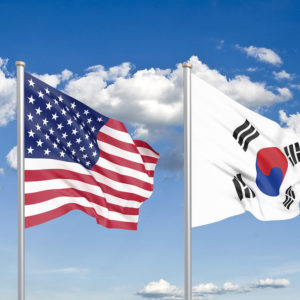PYEONGTAEK, South Korea — U.S. soldiers pour out of the walk-in gate of Camp Humphreys on a weekend afternoon, strolling by bars and restaurants, tailor shops and souvenir stands, breathing in the atmosphere after constraints are lifted and “the ville,” as GI’s have been calling the strip for years, is open again for fun and games.
Come evening and lines form outside a place called “Epic” as the manager holds back a crowd boisterously enjoying their first night on the town in months.
They’re happily waiting their turn to get in when two police cars roll up and five or six cops jump out wondering why so many are forgetting about social distancing even if they’re wearing masks and not making trouble. The popular club has to close well before the 10 p.m. curfew, a reminder that COVID-19 is not going away, not yet, and the rules are in force.
Life at Camp Humphreys, America’s largest overseas base, home to nearly 30,000 soldiers, contractors, and their families, is definitely a little confining in the era of the pandemic. GI’s may stroll outside the base in off-hours but are under orders not to venture into Seoul, an hour’s train ride away, 40 miles to the north.
Having made the move from the historic Yongsan base in central Seoul, the U.S. Forces Korea Command exists at Humphreys in a state of frustration if not suspended animation. While making life bearable for America’s 28,500 troops in Korea, commanders agonize over the reluctance of South Korean leaders to agree to joint war games with South Korean forces.
It’s not enough to conduct computer-driven exercises fine-tuning the ability of Americans and Koreans to communicate and respond on keyboards and screens. Soldiers, they say, should also share the difficulties and hazards of working together for real, in maneuvers once conducted regularly in vast stretches below the Demilitarized Zone. Since Donald Trump, in one of the more idiotic moves of his presidency, called off joint exercises after his summit in Singapore with North Korea’s Kim Jong-un in June 2018, U.S. and South Korean troops have hardly gotten to know each other.
It takes simulated combat conditions, not just computer games, say officers with experience in conflicts in the Middle East, for allies to gain the rapport needed to face a common enemy. That element has been missing since the last on-the-ground extensive war games involving U.S. and South Korean forces were conducted four years ago.
Now U.S. and Korean commanders are wondering what the peace-minded government of President Moon Jae-in will decide. They refuse to believe Moon is seriously opposed to the U.S. military presence, much less the South Korean-American alliance, but they’re concerned that his instinct is to want to avoid joint exercises while praying for negotiations and dialog with Kim Jong Un, who hasn’t accepted South Korean entreaties to talk since the failure of the second Trump-Kim summit in Hanoi two years ago.
If Moon is not averse to Americans and South Koreans playing games on computers, he still might see COVID-19 as providing a pretext or cover for canceling exercises of any kind. The danger of spreading the disease, the argument goes, is as high for skilled people working closely together on computers as it is for troops on maneuvers. Just because the National Football League in the U.S. and the Korean Baseball Organization in South Korea played full seasons under pandemic conditions, say the naysayers, does not mean soldiers should do the same in the field for the sake of a frayed alliance.
Young Americans are not excited about milling around in the countryside with Korean units, but they do say life inside the base can be boring. They may enjoy swimming pools, gymnasiums, and shopping zones complete with famous fast-food restaurants and coffee shops, and their new quarters surely are more congenial than barracks in the U.S., but they might want more to show for their time here.
Outside the walk-in gate on a Sunday afternoon, a motley assortment of rather elderly men and women are seen hefting American flags and signs telling the Americans not to listen to voices demanding they go home.
One Korean gentleman boasts his son served in the U.S. army years ago. “U.S. soldiers must stay,” he says. A few young Americans walk by, not paying much attention until reminded that some of the flag-wavers have memories going back to the Korean War. On a sunny day in “the ville,” war seems far away, undisturbed by the politics of war games.

